PIs of Tomorrow
Wednesday, February 11, 2026, from 10:45 to 12:30
The Finalists of PIOT 2026
We are pleased to announce the Finalists of the "PIs of Tomorrow 2026":
Dr. Theodora Constantin (University of Basel)
Dr. Juan Cruz Landoni (EPF Lausanne)
Dr. Olimpia Bompadre (EPF Lausanne)
Dr. Alaz Ozcan (University of Zurich)
Their research plans can be found below.
Congratulations and good luck at the final!!!
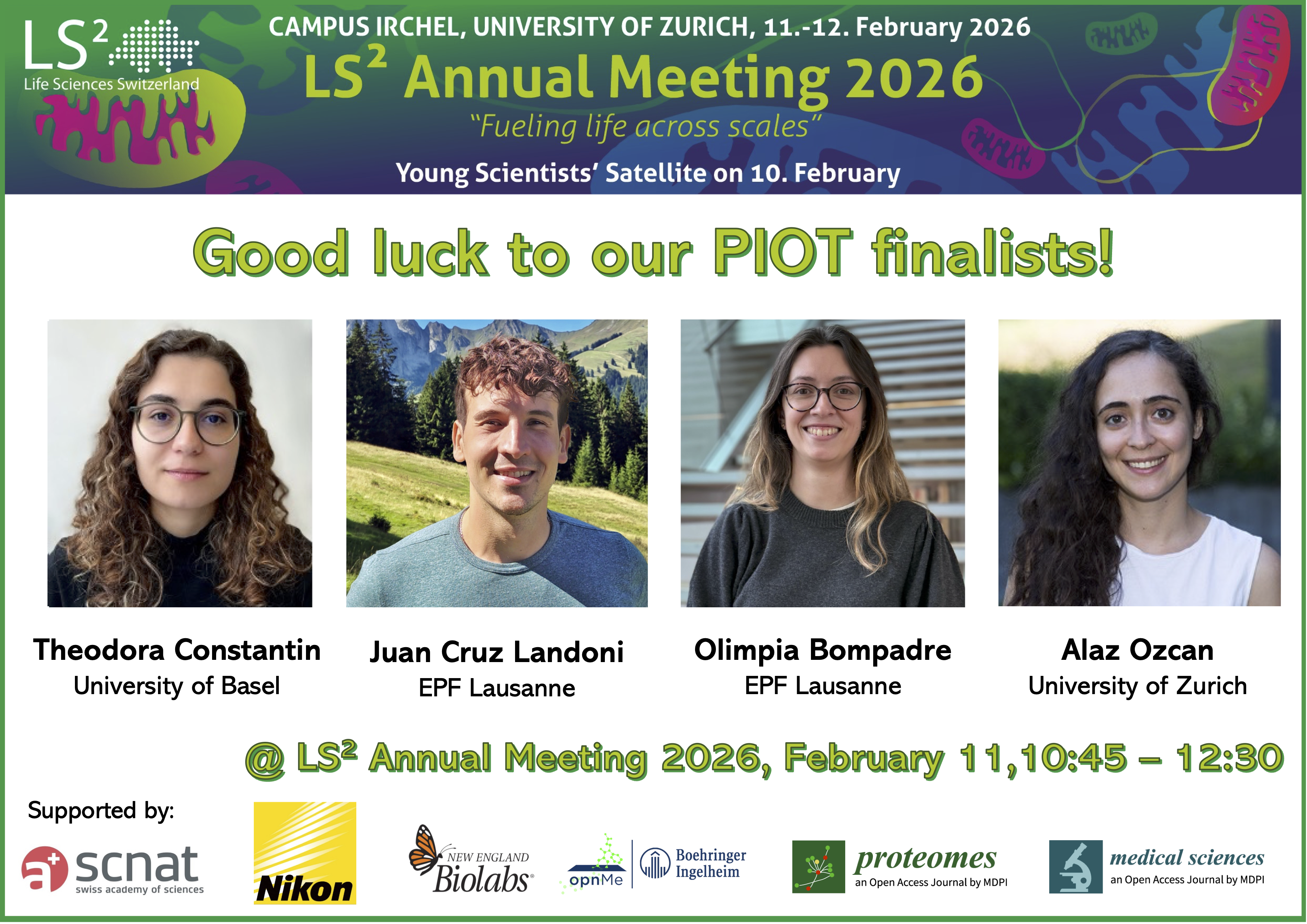
Dr. Theodora Constantin (University of Basel)
Bio: Theodora is a Postdoctoral Researcher in the Department of Biomedicine, University of Basel. She obtained her BSc in Biomedical Science from Imperial College London and her MSc in Pharmacology from the University of Oxford before returning to Imperial College to complete her PhD, focusing on CDK7 biology and therapeutic vulnerabilities in prostate cancer. At the University of Basel, she leads translational projects developing covalent PI3Kα inhibitors, integrating mechanistic signaling studies, in vivo pharmacology, chemical biology, and functional genomics. Previously supported by an Innosuisse innovation grant (as co-applicant) and now funded by the University of Basel’s Research Fund for Junior Researchers, she is building a research trajectory utilising covalent probes to define drug-target mechanisms and uncover new therapeutic opportunities in cancer.
Title of the talk: Unlocking the full potential of PI3Kα inhibitors for cancer therapy
Research plan:
Background: Phosphoinositide 3-kinase alpha (PI3Kα) is among the most frequently altered oncogenes in human cancer, with activating mutations and amplifications occurring across breast, endometrial, colorectal, cervical, pancreas, and other major tumor types. Despite decades of drug development and multiple generations of inhibitors, the clinical impact of PI3Kα targeting has remained limited by:
(1) rapid feedback-mediated pathway reactivation,
(2) suboptimal isoform selectivity, and
(3) cytostatic responses permissive of cancer cell adaptation.
Our recent work addressed the first two limitations by developing covalent probes with pharmacological profiles which enable selective irreversible inactivation of PI3Kα in cells and in vivo models. These compounds suppress PI3Kα reactivation and outperform reversible analogues and approved agents in sensitive cellular models.
Aims: Building on this foundation, this research plan seeks to understand and overcome the cytostatic and adaptive responses restricting the long-term efficacy of PI3Kα inhibition. My research team will first define which tumor contexts are uniquely sensitive to irreversible PI3Kα inactivation, quantify how long pathway blockade persists in cells and tissues, and uncover mechanisms by which cancer cells acquire resistance. Guided by these insights, we aim to identify combination strategies capable of inducing durable tumor regression.
Impact: The insights generated will establish a foundation for next-generation PI3Kα inhibitors and guide their clinical translation, with the potential to deliver more effective outcomes and broaden therapeutic opportunities across multiple tumor types.
Dr. Juan Cruz Landoni (EPF Lausanne)
Bio: Juan C. Landoni is a biomedical researcher passionate about mitochondria and how the interplay between their ancestral genome and cellular metabolism shapes our health. His work spans fundamental cell biophysics to translational genetics and metabolism, with a commitment to diversity and outreach. By integrating quantitative live imaging, traditional histopathology, and multi-omic analyses, he seeks to uncover the puzzling fundamental principles that govern tissue-specific mitochondrial dissemination and metabolic maturation and resilience, underlying organismal health, disease, and aging.
Title of the talk: Charting the spatiotemporal coordination of mitochondrial metabolism in development, disease, and aging
Research plan: Life is powered by the spatial organization of chemical reactions known as metabolism, and mitochondria are the ancestral central hubs for this process. Despite enormous progress in understanding mitochondrial biology and metabolism, we still have little understanding of their interplay in space and time in complex tissues, typically relying on homogenates and immortalized cells to study cell metabolism and dynamics. This knowledge gap is evident in the pathophysiology of mitochondrial dysfunction; even though all tissues vitally require mitochondria, mitochondrial diseases present as a myriad of tissue-symptom-age constellations with unexplained mechanisms and often paradoxical therapeutic outcomes. Deciphering the dynamic interplay between mitochondria and metabolism in live tissues offers an exciting opportunity to reveal the mechanisms underlying genetic, acquired, and aging-related disease, and to uncover innovative, tailored therapies to improve patient care. To achieve this, my laboratory will focus on the following axes:
1. Identify the tissue-specific dynamic mechanisms for mitochondrial DNA distribution.
2. Map the metabolic coordination of mitochondrial genome proliferation during tissue differentiation.
3. Elucidate protective metabolic responses to chronic mtDNA replication stress.
By integrating cutting-edge quantitative live imaging, traditional histopathology, and multi-omic analyses, and applying them with imaging-compatible alternative animal models (C. elegans and zebrafish), we will chart the historically overlooked spatiotemporal dimension of tissue metabolism and pathology, with a special focus on mitochondria and mitochondrial genome homeostasis, and identify the mechanisms and metabolic programs underlying mitochondrial abundance and metabolic resilience. By design, this work aims to provide vital information for the treatment of devastating human mitochondrial diseases, as well as to inform preventive strategies for vulnerable populations such as high-risk groups for HIV exposure and the elderly.
Dr. Olimpia Bompadre (EPF Lausanne)
Bio: Olimpia Bompadre is a postdoctoral scientist in Didier Trono’s lab at EPFL. She completed her studies at the University of Glasgow and Cambridge and obtained her PhD at the University of Geneva, focusing on the link between cis-regulation and cell identity in limb development. Her current work focuses on KRAB zinc finger proteins and H3K9me3-mediated chromatin regulation in colorectal cancer.
Title of the talk: Multi-Scale Dissection of Heterochromatin Regulation in Cancer Initiation
Research plan: Colorectal cancer (CRC) is the third most common cancer worldwide, with incidence steadily increasing in younger patients. While the genetic basis of CRC has been extensively studied, the role of epigenetic abnormalities in early tumorigenesis remains less well understood. Among chromatin modifications, H3K9me3 has emerged as a central regulator of genomic and epigenomic stability and lineage fidelity. Aberrant H3K9me3 deposition is increasingly linked to tumorigenesis, where its disruption can destabilize developmental programs, fuel transcriptional plasticity, and promote clonal heterogeneity. Yet, how these processes unfold during CRC initiation is poorly defined. Krüppel-associated box zinc finger proteins (KZFPs), the largest family of human transcription factors, guide H3K9me3 deposition by recruiting TRIM28/KAP1 to transposable elements (TEs). Thus, they insulate TE-derived cis-regulatory networks from aberrant activation. Disruption of this KZFP–H3K9me3 system may act as a key driver of epigenetic heterogeneity and clonal emergence in CRC.
The overall objective of this project is to establish how KZFP-mediated heterochromatin repression integrates gene regulation and clonal plasticity in colorectal cancer. To address this, I propose three specific aims:
1.Defining H3K9me3 dynamics at single-cell resolution by combining dual histone mark profiling (H3K9me3/H3K27ac) with transcriptomics in patient-derived organoids across normal, adenoma, and carcinoma stages.
2.Testing the causal role of H3K9me3 in lineage fidelity through lineage-specific ablation of TRIM28/KAP1 using a reporter-sensor system in organoids, followed by transcriptomic and epigenomic profiling.
3.Decoding KZFP regulation through promoter grammar using deep-learning prediction of promoter activity (PARM) and functional validation in CRC contexts.
This project integrates computational modeling, state-of-the-art organoid systems, and single-cell multi-omics to generate a comprehensive framework of how H3K9me3 dynamics shape the epigenetic landscape of early CRC. The expected results will uncover cell-type–specific dependencies on H3K9me3, reveal how epigenetic heterogeneity emerges from non-coding genome dysregulation, and identify new vulnerabilities in early tumorigenesis. By elucidating an overlooked layer of gene regulation, this work will provide both conceptual advances and potential therapeutic entry points in cancer biology.
Dr. Alaz Ozcan (University of Zurich)
Bio: Dr. Özcan is a Junior Group Leader at University of Zurich, where she leads research on innate immunity, focusing on how myeloid cells adapt their functions in both healthy and diseased tissues. She began her scientific training at Boğaziçi University, earning dual B.S. degrees in Molecular Biology & Genetics and Chemistry in 2014. She completed her M.S. in Biology at ETH Zurich in 2016 and her Ph.D. in Immunology at the University of Zurich/University Hospital Zurich in 2021. Dr. Özcan then continued her academic career at Yale University in the United States, working as a postdoctoral fellow and later a postdoctoral associate until 2025. Her work has been recognized through several notable awards, including the Swiss National Science Foundation’s Postdoctoral Mobility Fellowship (2022), the Gershon Fellowship at Yale University (2024), and a Postdoctoral Fellowship from the University of Zurich (2025). In 2025, she founded the Swiss Myeloid League, a scientific network that brings together researchers, clinicians, and industry partners across Switzerland who share an interest in myeloid cell biology. Driven by curiosity and collaboration, her research seeks to uncover how myeloid cells shape, and are shaped by, the tissues they inhabit.
Title of the talk: Neutrophils Beyond the Battle: Architects of Defense
Research plan: My research program will define how neutrophils act as structural regulators of tumor biology, focusing on their newly discovered ability to produce extracellular matrix (ECM) and reshape tissue architecture. Building on my recent identification of matrix-producing neutrophils (MPNs) in barrier tissues and pancreatic ductal adenocarcinoma (PDAC), I hypothesize that cytokine-driven “structural reprogramming” equips neutrophils with ECM-building functions that critically influence tumor mechanics, immune infiltration, and therapeutic response. Preliminary data show that nearly half of tumor-associated neutrophils acquire collagen-producing capacity within two weeks of tumor initiation, that this program depends on TGF-β and G-CSF signaling, and that tumor growth accelerates when neutrophil structural programming is genetically blocked, revealing an unanticipated link between neutrophil-derived stroma and tumor progression. To test this hypothesis, my lab will pursue three integrated objectives:
(1) define how MPNs sculpt tumor architecture using single-cell transcriptomics, 3D imaging of neutrophil-derived ECM, and ultrastructural and proteomic analyses in desmoplastic and non-desmoplastic PDAC models;
(2) determine how neutrophil-driven stromal remodeling regulates immune cell infiltration and immunotherapy efficacy by integrating spatial and high-dimensional immune profiling with checkpoint blockade studies;
and (3) identify and manipulate the cytokine networks that establish the structural neutrophil fate, using ex vivo programming and adoptive transfer into engineered mouse models to modulate stromal composition and tumor control.
Together, this work will establish neutrophils as active architects of the tumor microenvironment and illuminate new therapeutic strategies for reprogramming tumor stroma, advancing a broader conceptual framework of “structural immunity” with implications for fibrosis, chronic inflammation, and tissue repair.
The Chairs of PIOT 2026
|
Dr. Ana Ricardo da Costa Xavier, Postdoc, University of Basel After completing her Bachelor's degree in Genetics and Molecular Biology, she pursued a Master's in Human Biology at the University of Lisbon, Portugal. During this time, she investigated chronic inflammatory bowel disease using Ncf1-mutated mouse models, focusing on therapeutic strategies through inflammatory marker analysis. This experience sparked her interest in immunology and inflammation, leading her to Basel, Switzerland, where she joined the Cancer and Immunobiology lab for her PhD. Her doctoral research focused on dissecting PI3Kg signaling pathways in allergy, inflammation, and immune modulation. Since April 2024, she has continued in the same group as a postdoctoral researcher, now studying signaling nodes involved in drug-induced hypersensitivity reactions. |
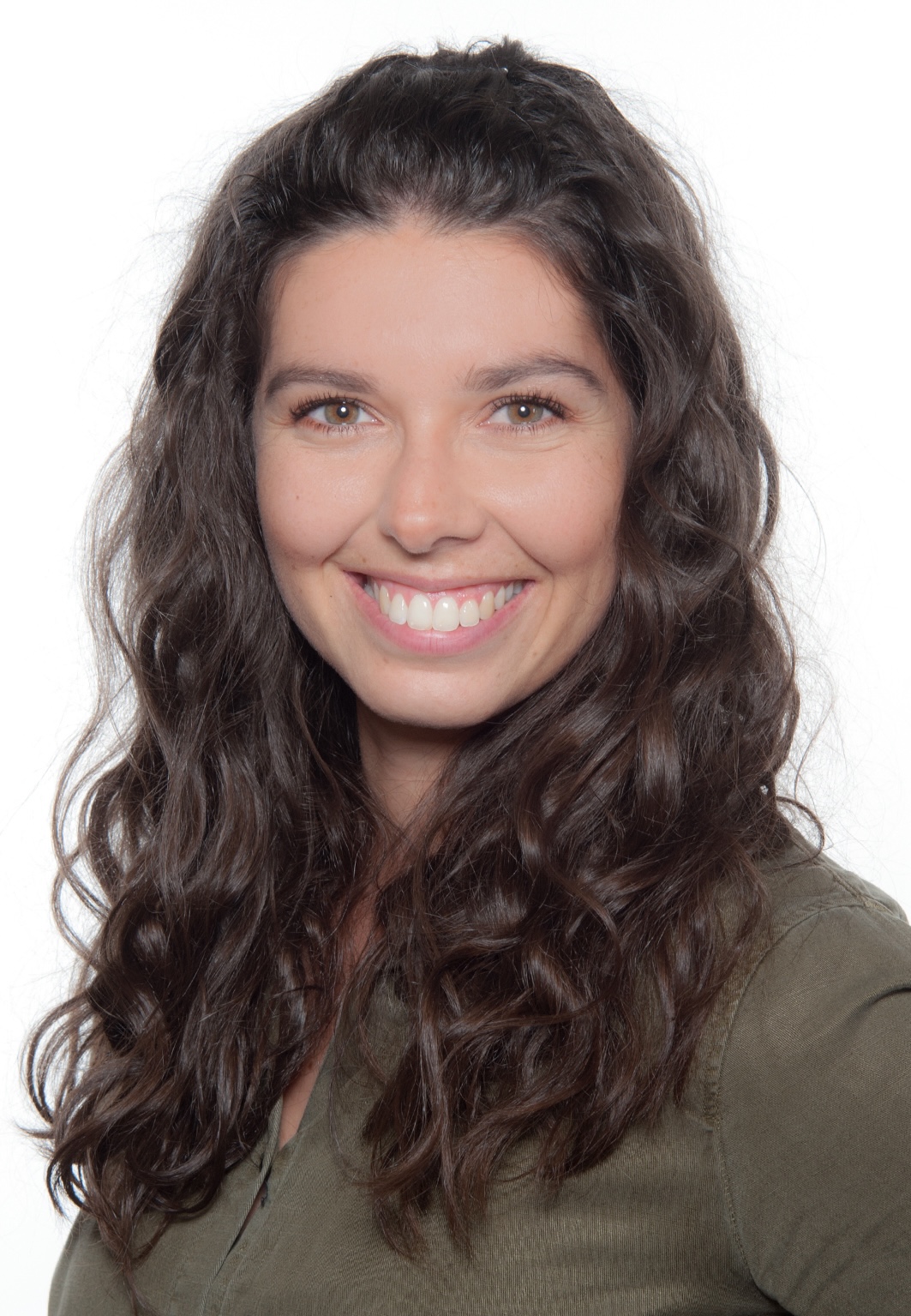 |
|
Dr. Carina Osterhof, Maître assistante, University of Fribourg She earned her BSc (2014) and MSc (2015) in Molecular Biology and Bioinformatics at the Johannes-Gutenberg University in Mainz. For her PhD (2016–2022), she joined Prof. Hankeln’s laboratory (Mainz), where she investigated the molecular function and transcriptomic regulation of oxygen-binding proteins. In 2023, she moved to Switzerland to join Prof. Hoogewijs’ lab at the University of Fribourg as a SNSF postdoctoral fellow in comparative oxygen physiology. Since Mai 2025, she has held the position of Maître assistante at the same institution, where she coordinates mechanistic studies of a novel ciliopathy regulator, establishes new model systems for oxygen-adaptation research, and teaches physiology to medical and biomedical-science students. |
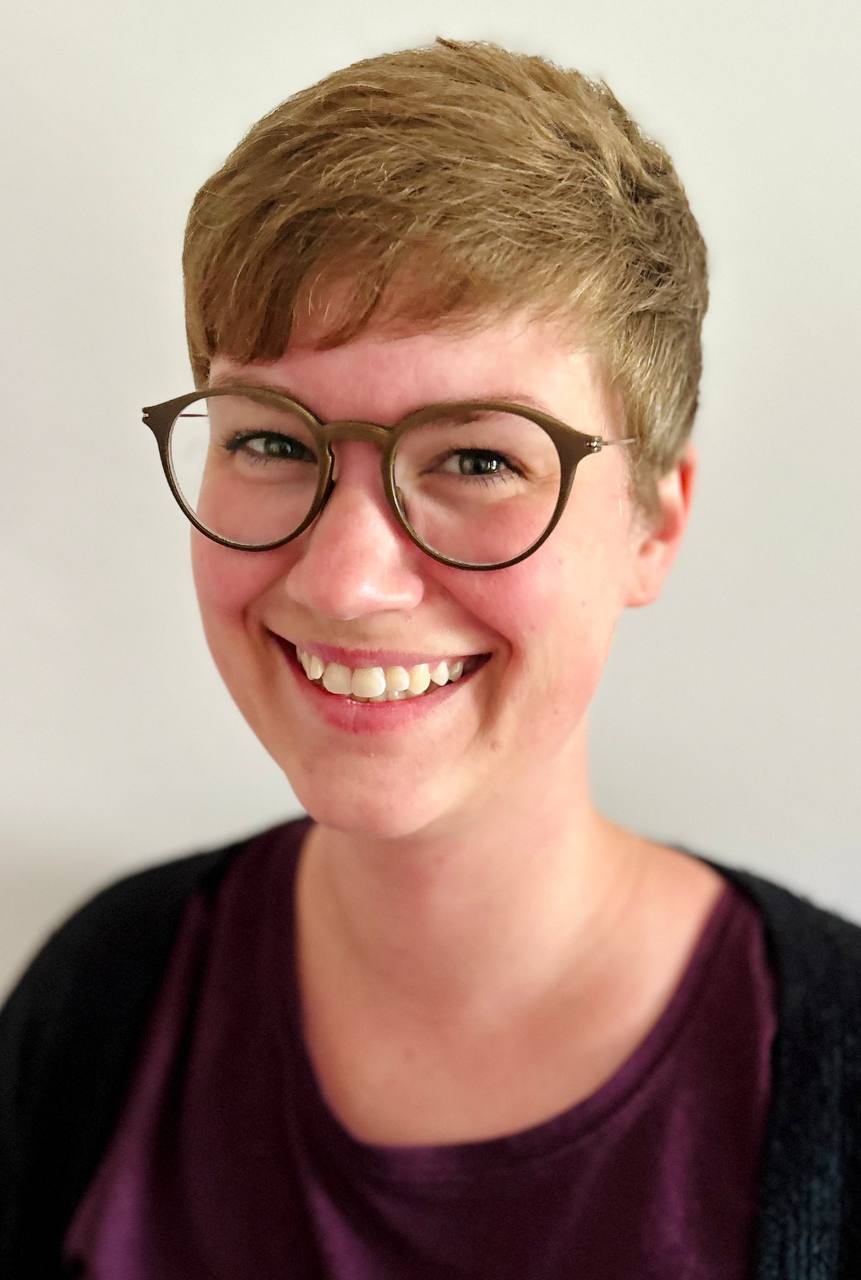 |
|
Dr. Manon Guivier, Postdoc, Adolphe Merkle Institute, University of Fribourg After completing a bachelor degree in Engineering sciences and two master degrees in Materials sciences and Mechanical engineering, she started a PhD in Paris-Saclay University in France. Her PhD focused on the development of new bio-based food packaging with high barrier properties. Beginning of 2024, she moved to the Adolphe Merkle Institute in Fribourg, Switzerland, after winning the Women in Science Fellowship (WINS) of the NCCR Bio-inspired Materials. Since, she has been working on bio-inspired and bio-based materials complying with industrial needs for new sustainable materials. |
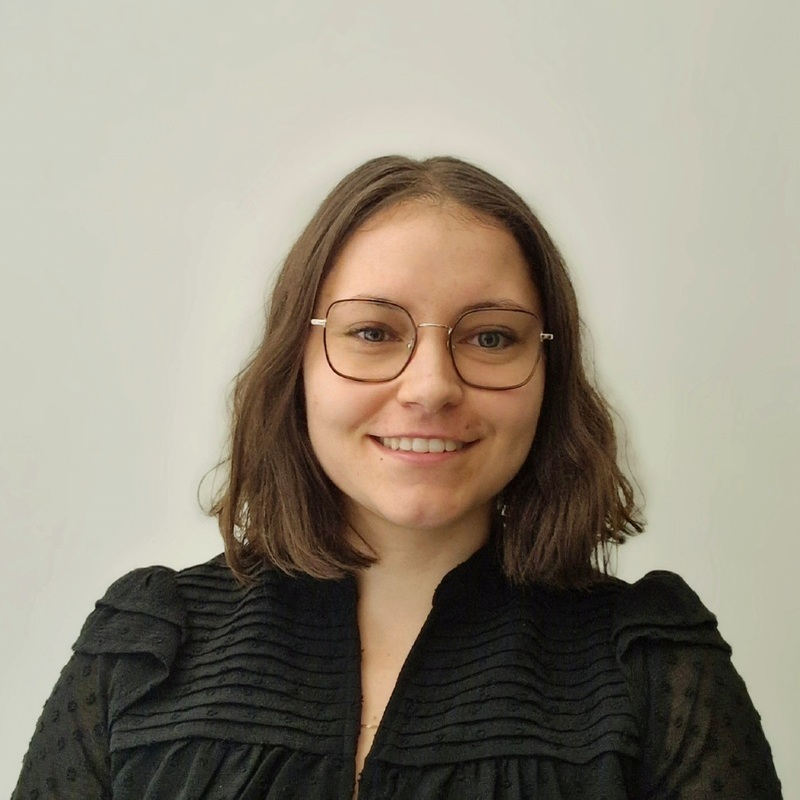 |
|
Dr. Monika Gjorgjieva, Ambizione Fellow, University of Geneva She is Macedonian and moved to France for her studies. She earned a Bachelor’s degree in Biology (Reims) and a Master’s in Genetics (Lyon), followed by a PhD in Lyon, France, where she focused on hepatic and renal pathologies associated with disturbed systemic metabolism, in particular focusing on Glycogen storage disease type I and diabetes type II. In 2018, she began a postdoctoral fellowship in Geneva, researching microRNAs and their role in metabolism and hepatocarcinogenesis in the team of Prof Michelangelo Foti, PHYM department at University of Geneva. Following this, she worked as a maître assistante at the University of Geneva (2021–2024), leading an independent project on ER stress and nephropathy. As of January 1, 2025, she has started an SNSF-funded Ambizione fellowship to explore metabolic disturbance-driven renal cancer. |
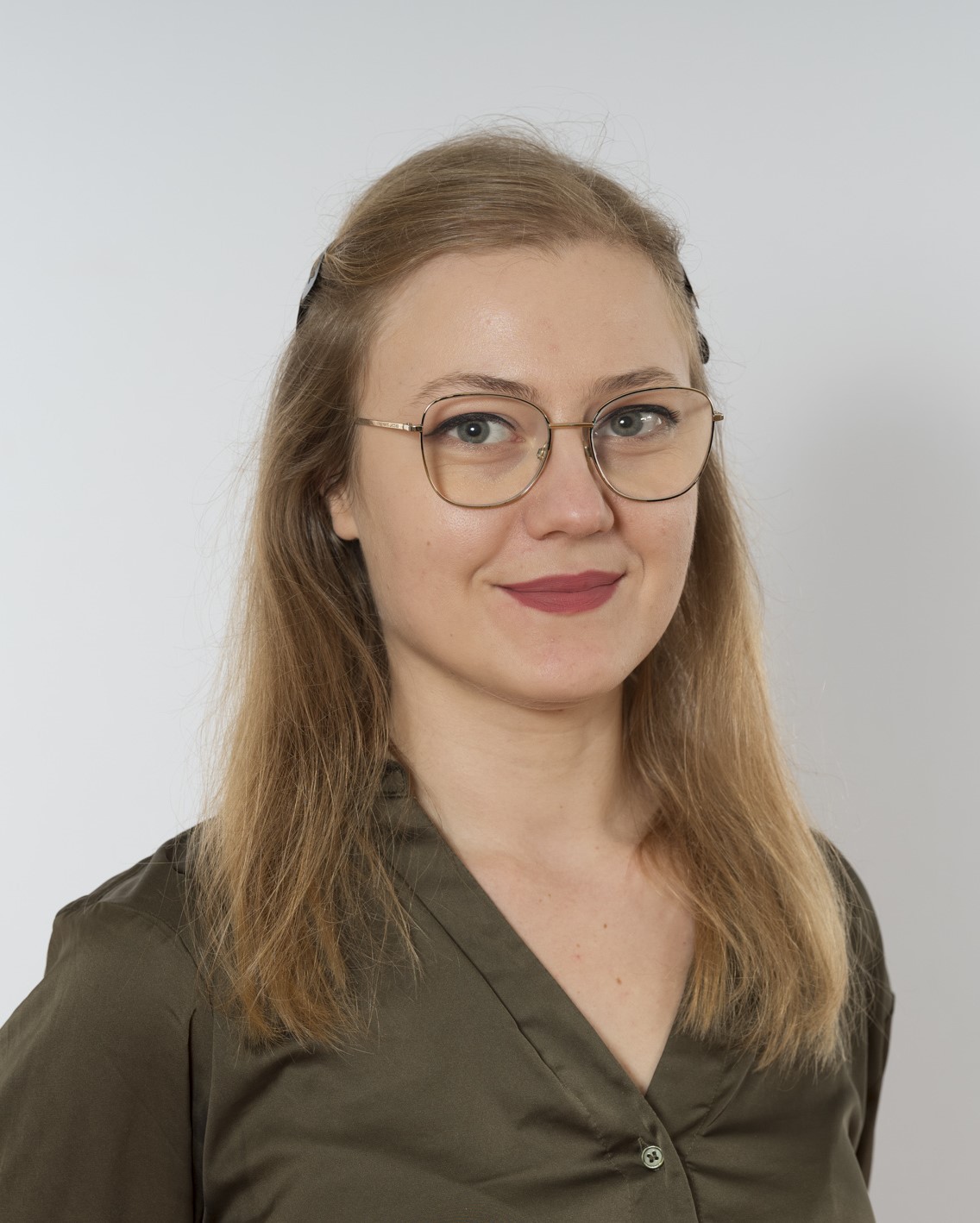 |
Where are the past winners now?
-
- Lucia Prieto-Godino: 2017 Jury & Public Award Winner
Awarded FENS EJN Young Investigator Prize, L’Oreal-UNESCO for women in science Fellowship
Now Group Leader at the Francis Crick Institute (London, UK) - Alexander Harms: 2018 Jury Award Winner
Awarded SNSF Ambizione
Now Assistant Professor of Molecular Phage Biology at ETH Zurich (CH) - Andreas Moor: 2018 Public Award Winner
Awarded SNSF Eccellenza, ERC Starting Grants
Now Assistant Professor of Systems Physiology at ETH Zurich (CH) - Michael Zimmermann: 2019 Public Award Winner
Awarded SNF Advanced Postdoc Mobility Fellowship, SwissTB Award, EMBO Long-Term Fellowship, SNF Early Postdoc.Mobility Fellowship Now Now Group Leader at EMBL (DE) - Francesca Ronchi: 2019 Jury Award co-Winner
Awarded SNSF-MHV Postdoctoral fellowship, ECCO Grant
Now Associate Professor at Charité – Universitätsmedizin Berlin (DE) - Jean-Philippe Krieger: 2019 Jury Award co-Winner
Awarded an SNF postdoctoral fellowship
Now PI at the VAGALAB and University of Gothenburg (Sweden) - Thomas O. Auer: 2020 Jury Award Winner
Awarded an Ambizione Fellowship, Now Assistant Professor at the University of Fribourg (CH) - Joachim Moser von Filseck: 2020 Public Award Winner
Now Research Group Leader at the Heidelberg University Biochemistry Center (DE) - Elisa Araldi: 2021 Jury Award Winner
Now Assistant ProfessorAssistant Professor at the Università degli Studi di Parma (IT) - Karina Silina: 2021 Public Award Winner
Now Senior Researcher at the Institute for Experimental Immunology, University of Zurich - Alicia Michael: 2022 Jury Award Winner
Now Postdoctoral Researcher at Friedrich Miescher Institute for Biomedical Research - Adam Gosztolai: 2022 Public Award Winner
Now a Human Frontiers Postdoctoral Fellow in the group of Pierre Vandergheynst at EPFL (CH) and Research Affiliate at Massachusetts Institute of Technology (US) - Dr. Rubén Delgado Manzanedo: 2023 Jury Award Winner
Now Lecturer at the Department of Environmental Systems Science, ETH Zurich (CH) - Dr. Bernadette Jana Stolz-Pretzer: 2023 Public Award Winner
Now Scientist at EPFL (CH) - Dr. Sandhya Manohar: 2024 Public Award WinnerNow SNF Ambizione Fellow at UZH (CH)
- Lucia Prieto-Godino: 2017 Jury & Public Award Winner

